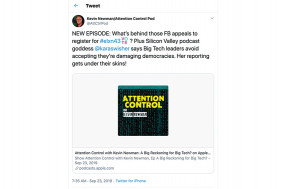Has technology compromised our democracy?
Stuart Coxe explains the thinking behind his new podcast, Attention Control with Kevin Newman, which examines the ways our technology is manipulating us—and maybe this election—and provides some tools for navigating the unpredictable news environment.

Jim Balsillie and Kevin Newman recording the Attention Control podcast.
“We're in a surveillance state, only it's being done by private corporations, and they're in cahoots with political parties that are more than happy to trade off our election Integrity for being in power.”
That’s Jim Balsillie, one of the creators of the mobile information economy we now live in, and he knows technology. Balsillie is in a studio speaking to Kevin Newman—one of the country’s most respected and accomplished broadcast journalists—for our new podcast, Attention Control. It’s a series that looks at the ways technology is influencing our democracy.
“I think we, structurally, have compromised our election,” Balsillie continues. “I'm not being alarmist here. This is a very serious force. We saw what happened in the Brexit elections. We saw what happened in the U.S. Canadians are among the biggest social media users in the world—bigger than the U.K. and the U.S. So how could we not be more prone to being hijacked?”
Attention Control is the product of a unique Canadian alliance of academics, journalists, philanthropists and private media companies aiming to provide some real-time, actionable information for citizens trying to participate in democracy during this unpredictable news environment.

An episode of the Attention Control podcast addresses big tech's relationship with democratic processes
Since the Cambridge Analytica scandal broke, we’ve known that our data is available to anyone, for a price. That information allows advertisers to work our emotions in ways we may not even be aware of. By one estimate, Facebook alone has 52,000 traits they can identify in each of us. It has become a given that social media platforms don’t need to listen to the microphones on our phones—they already know what we’re going to say.
And what’s the currency for all this emotional manipulation, especially when it comes to politics? Call it fake news. Or selective news. Or maybe call it the truth that’s being hidden by the mainstream media. Take your pick.
According to Taylor Owen, associate professor at the Max Bell School of Public Policy at McGill University, this kind of rampant misinformation has become a global arms race.
“Governments are trying to figure it out. Journalists are trying to figure it out, and academics are trying to figure it out. We've had half a dozen or so big elections since 2016. And in each one, a community of scholars and activists and non-profit organizations and governments have all tried to understand how the information environment is being manipulated.”
Social media platforms don’t need to listen to the microphones on our phones—they already know what we’re going to say.
Not only is Owen conducting unique research during this election on Canadian’s online media consumption, he’s also working closely with our podcast team to share those insights as he uncovers them.
Our group is involved in the podcast (which has a number of other excellent journalists and researchers contributing to the content, including former CBC journalists) because we all feel that, at some level, we need to shine a light on these little-understood forces and try to arm citizens with some tools to help navigate them.
Our broadcast airwaves are heavily regulated public spaces, says Owen, but not our social media platforms. “We've allowed them to be fully privatized. And until we bring some transparency to that and understand the effect that is having, I think we're a long way from developing the right policies to say we have integrity in our public space.”
- Where’s local news in the Facebook age?
- Why we need campus radio, and how Ontario’s Student Choice Initiative could kill it
- How traditional media and government failed to prevent or deal with the Hamilton Pride debacle
Canadians will have to decide in this election, and in those to come, whether that’s an issue that really concerns them, or not. The goal of our show is to point out the forces, both individual and systemic, that are changing the nature of our national conversation. And it starts with basic media literacy. One tip Taylor shared with Kevin in the podcast might be obvious to experts, but certainly wasn’t to me.
Here’s their exchange:
Taylor: “Trending on Twitter is not in and of itself a meaningful election activity. There's a lot of gaming going on here where groups are trying to flood the zone with content in order to get the attention of journalists. So we need to be really careful about what messages we amplify, and not make more of a deal of these flurries of activity than they actually are. It's only really when they're changing people's minds that they're important.”
Kevin: “So I think you're telling me they’re not really trying to game the voter. They're trying to game people like you and me.”
It’s the very value of our mainstream media, in which Canadians still have a relatively high level of trust, that makes us targets for online misinformation campaigns.
It’s the very value of mainstream media, in which Canadians still have a relatively high level of trust, that makes us targets for online misinformation campaigns. The big question is: if we are fooled, how easy will it be to dupe a citizen who isn’t a professional academic or journalist? Less so, we hope, with our podcast.
Attention Control is an initiative of the Max Bell School of Public Policy at McGill University, funded by a grant from the Rossy Foundation and the David Family Foundation. It’s being produced by my company, Antica Productions, in association with CTV News, and Kevin Newman is the podcast’s editorial leader and host. It’s available wherever you get your podcasts, or at https://www.attentioncontrolpod.com/
